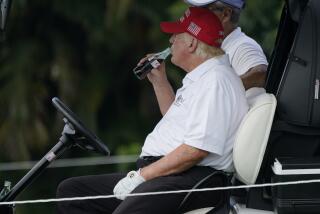Clinton, Teens Discuss Youth Access to Tobacco
- Share via
WASHINGTON — President Clinton, opening up a new page in his campaign against tobacco, met with a group of teenagers Monday at the White House and told them that his daughter, Chelsea, nagged his mother so mercilessly about her lifelong smoking that she kicked the habit.
“My mother had smoked all her life, practically since she was a teenager,” he said. “My daughter kept telling her what her lungs looked like, this 8-year-old beating up on her grandmother.”
Chelsea Clinton’s grade-school class saw photos of “lungs in progression . . . and she saw all those black lungs, and it made this vivid impression,” the president said. “And for her 8th birthday, my mother stopped smoking. That was her gift to her granddaughter for her 8th birthday.”
The president’s mother, Virginia Kelley, died two years ago of breast cancer.
Linking the issue to family values, Clinton told his young audience that parents, not the tobacco industry, should control the smoking messages directed at children. Clinton himself is an occasional cigar smoker, a habit he is not allowed to indulge inside the White House.
“Children should have a chance to learn within the family unit, within the school, within the churches and in the community, without being bombarded by all kinds of destructive messages that will knock them off track,” he said. “Ultimately, this is an effort that will give some dimension of real control and values back to the family, which is what we want to do.”
But he defended the government’s involvement in trying to restrict teenage access to cigarettes, saying: “While the government can’t solve all our problems, we have no business going back to a time when everybody was left to fend for themselves. These are things we have to do together.”
His administration has proposed a series of stringent regulations to curb teenage smoking, including prohibiting sales to those younger than 18 and requiring proof of age. Other proposals are to ban cigarette vending machines and self-serve displays and forbid advertising near schools and playgrounds and at sporting events.
The proposal was initiated by the Food and Drug Administration, which believes that it has the authority to regulate cigarettes as drug-delivery systems because of the addictive nature of nicotine.
About 40 million to 50 million Americans smoke, and numerous studies have shown that most of them began before age 19.
Clinton met with the youths, community leaders and PTA officials to discuss, among other things, the ease with which teenagers now can buy cigarettes, despite state laws that forbid it. The participants included teenagers who conducted their own survey of cigarette sales to teens.
“I did about 20 stores in one day, like gas stations and 7-Elevens, and we’d go up to the counter and try to buy cigarettes,” Christy Franco, 17, of Vienna, Va., told Clinton. “If they sold it to us, like if they actually rung it up, we gave them a ‘gotcha’ card,” informing them that they had just broken the law. “Probably 60% sold them to us.”
Ricky Lovelace, 17, of Fairfax, Va., whose aunt and uncle died of tobacco-related illnesses, said that he was able to get cigarettes from 11 of 12 vending machines without anyone stopping him. “The one time we couldn’t get the cigarettes out was when . . . you have to have a token for it, so we had to go up to the cash register, show them your ID and then you get a token so you can put that in there and then get the cigarettes.”
Clinton reemphasized the importance of curbing advertising targeted at youths.
A national center aimed at discouraging youngsters from smoking will open here in June, officials announced Monday.
The National Center for Tobacco-Free Kids received $20 million in funding from the Robert Wood Johnson Foundation, a public health philanthropic organization, and $10 million from the American Cancer Society.
More to Read
Get the L.A. Times Politics newsletter
Deeply reported insights into legislation, politics and policy from Sacramento, Washington and beyond. In your inbox twice per week.
You may occasionally receive promotional content from the Los Angeles Times.









